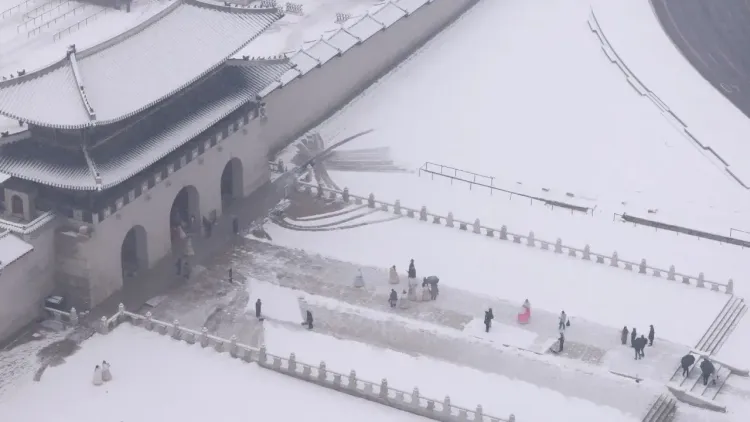Significant Snowfall Covers Greater Seoul and Eastern Gangwon Province in South Korea

Seoul, Jan 5 (NationPress) A substantial layer of snow enveloped the larger Seoul area as well as the eastern region of Gangwon on Sunday, leading officials to elevate the weather warning and prepare for potential disruptions. Fortunately, reports indicated that no significant damage had occurred.
By noon, Seoul had recorded approximately 6 centimeters of snow in various locations, prompting the mobilization of around 5,245 personnel and 1,439 pieces of equipment dedicated to clearing roadways, according to the Seoul metropolitan government.
Despite the heavy snowfall, city officials confirmed that no major damage had been reported. The heavy snow alert was officially lifted at 12:30 p.m.
In the surrounding Gyeonggi Province, several northern cities experienced up to 10 cm of snow, while the border town of Paju received around 12 cm as of 3 p.m. The heavy snow alerts in this region were also lifted after 1 p.m.
In Gangwon Province, authorities restricted access to approximately 25 trekking routes within national parks to ensure visitor safety. Additionally, a morning flight from Wonju to the southern resort island of Jeju was cancelled.
As of 3:30 p.m., most heavy snow alerts had been removed across the country, with the exception of the mountainous areas of Jeju, as reported by the Korea Meteorological Administration (KMA).
The KMA had previously projected that Seoul could receive an additional up to 8 centimeters of snow through Monday, with both Gyeonggi and Gangwon provinces expected to witness as much as 10 cm during the same timeframe, according to reports from Yonhap news agency.
The Ministry of Interior and Safety announced the activation of the Central Disaster and Safety Countermeasure Headquarters at Level 1 and raised the crisis alert status from attention to caution at 8 a.m.
Acting Interior Minister Ko Ki-dong directed relevant agencies to deploy all available personnel and equipment to mitigate the impacts of the heavy snowfall and to implement strategies aimed at reducing public inconveniences, such as traffic congestion.
In a notable weather event earlier in 2024, South Korea's capital city recorded a historic November snowfall exceeding 16 cm that blanketed Seoul, according to weather service reports.
The snow that began falling in Seoul reached 16.5 cm, marking the highest November snowfall recorded since modern weather observations commenced in October 1907, as stated by the KMA.
This amount surpassed the previous record of 12.4 cm, which had been documented on November 28, 1972.










